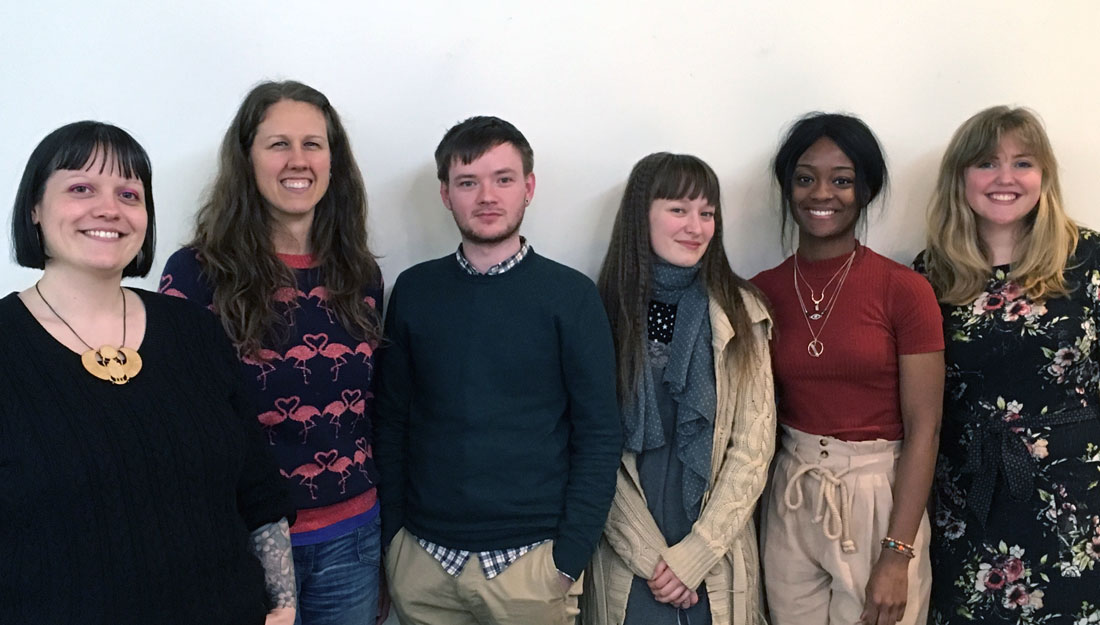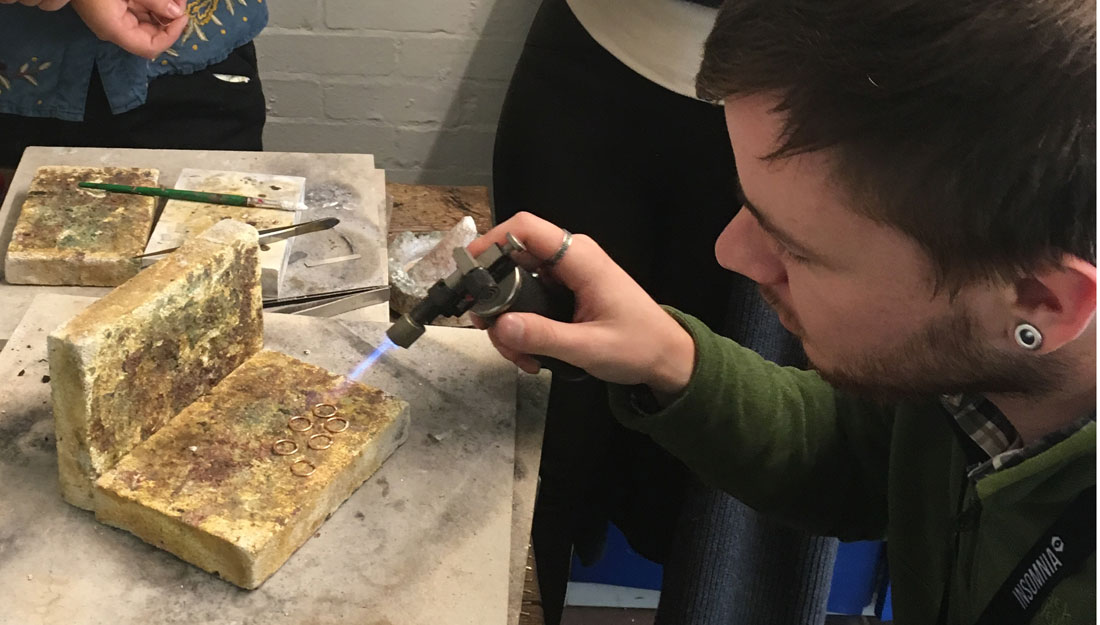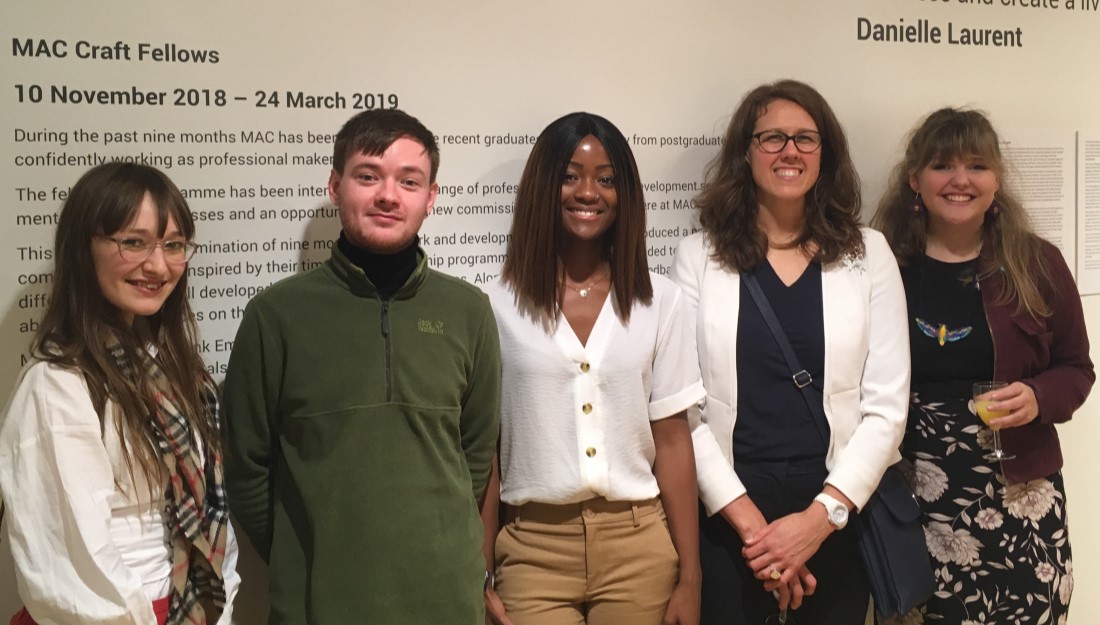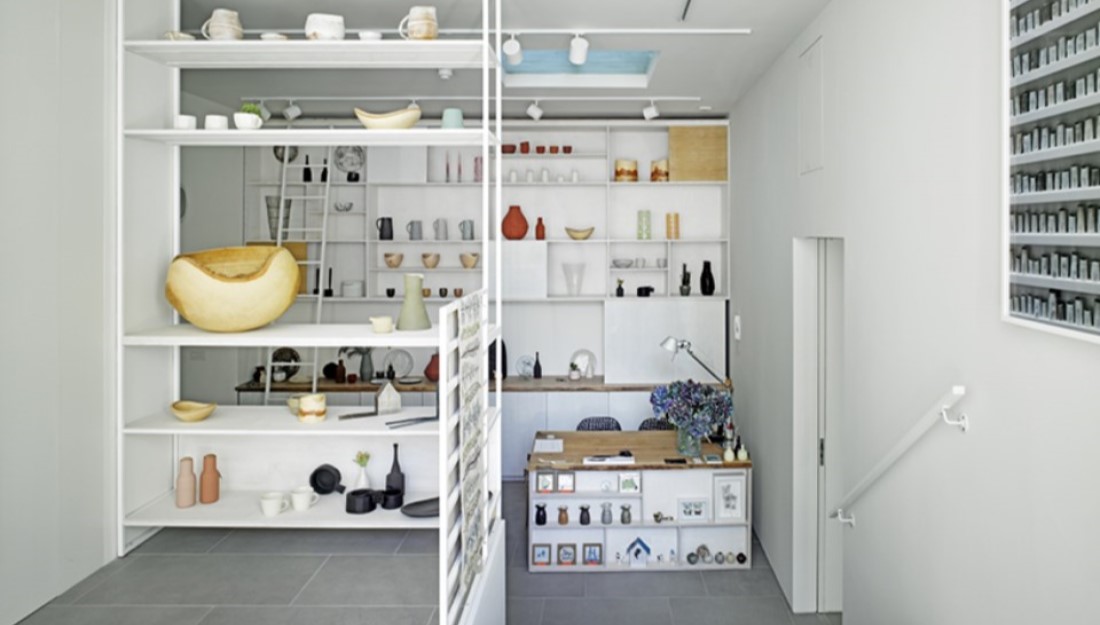Speaker: Patricia van der Akker – The Design Trust
A partnership between MAC Birmingham and Craftspace

Craft Fellows 2018 with Jess Litherland, MAC Birmingham
Top tips from Patricia van der Akker – The Design Trust
Patricia van den Akker is an award-winning creative business adviser, trainer and coach who has worked for more than 20 years with 1,000s of creatives, especially designer makers. She is the Director of The Design Trust, an online business school for designers and makers. You can find more useful blog posts and training on The Design Trust website www.thedesigntrust.co.uk
1 Why is business planning a good idea?
Let’s start with the basics! Do you know where you want to take your craft business in the next 5 years? In the next two years? What would you like to happen? Where would you like to sell your work? Who do you want to work with? What kind of work do you want to make?
Unless you know where you want to take your craft business it’s going to be hard to move forward. You will be going round and round in circles. Knowing what success looks like for you is the starting point. Sit down for a moment and think about what you want to achieve in the next 2 – 5 years.
Be as specific as possible. What kind of work do you want? What makes you special and different from others? Do you want to make large work, conceptual or functional work? Who would use or buy your work? Which events would you like to take part in? Do you want to create affordable work, in the middle or for the luxury market?
The clearer you get on what you want to achieve the better.
Having a plan with some clear goals will help you to move forward and create the business you want, rather than hoping or waiting for something to happen. Business planning will help you to become more pro-active and focused. And working towards a clearer goal will help you get clarity, rather than being pulled in all sort of directions.
Did you know that if you write down your goal that you are a lot more likely to do it? It’s scientifically proven that people who write down their goals in detail are a lot more likely to succeed. So go on, get a piece of paper, answer those questions and write down what you want to do in the next 2-5 years.
2 Start with the end in mind
This concept was developed by business guru Stephen Covey. Instead of just doing whatever is urgent on your to do list right now, start with developing your ideas of where you want to take your craft business.
Indeed … we already started with this in tip number 1!
Look at what you want to achieve first, and then identify what you need to do to get yourself there. This will help you to focus on the bigger parts of creating your business (your work, marketing and sales) rather than wasting your time on less important activities.
3 Break big goals down into smaller parts
Are you feeling overwhelmed with starting your own craft business? So much to do? So much to think about? It’s very easy to feel overwhelmed when you are starting a business, and to make you feel more confident it can really help you to break down what needs to be done in smaller jobs.
For example if you want to start a craft business then you need to have some products and ideally create a coherent collection of products you are proud of. Do you know who your clients could be and where they are? Which events do you need to go to or which online places are the best to sell your work? You need to learn about costing and pricing your work. You need some images to share on your website and social media, and to apply for events or grants.
Brainstorm right now what you need to do, learn, have or create.
If you identified your goal for the next two years then start planning out what you need to work on and when. What do you want to achieve by the end of this year? What do you need to do in the next quarter?
When you have written down your list then try to identify your priorities for each. What needs to be done first? What comes after that? What’s important? What’s urgent? That’s when you start to work to turn your big ideas into real do-able actions.
4 Group your business activities
Starting your own business can feel very overwhelming. If you are your own boss then you have loads of different hats to wear! You want to be a maker of course, but you also need to look at your marketing and finances if you want to create a successful business!
Can you group your activities into specific business areas? Did you include activities under finance, administration, costing and pricing, marketing, social media in the previous step?
If you want to move your business forward in an easier way then do group activities that belong together in the same group. For example make Tuesdays and Fridays your marketing days; do all your admin and bookkeeping on Friday morning; check your emails only three times a day; do most of your social media in the evening; and go to the post office only twice a week. It will really simplify your life and business and will save you a lot of time and energy.
5 Make time to do the work
It’s all good and well to plan but … you need to do the work to make it happen! How much time have you got to work on your craft business and develop it? Especially if you are part-time then it’s really important that you make time to start to grow your craft business.
Have you got a similar amount of hours each week? Have you got similar days in the week that you can work on your business? It’s really useful to create a habit of working on your business at the same time each week.
At the beginning of each quarter it’s useful to set goals for that quarter. What do you want to achieve financially (your sales, profit/salary) in the next 90 days? Where are your sales coming from (online, events, commissions)? What do you need to do to achieve those sales?
Once you know what you want to work on in the next 90 days; set goals or deadlines of what you need to work on in the next month. Then you can break it down further, what to do each week.
I find it really useful to have specific days to focus on my marketing or finance. With this break down I can then add at the start of the month or start of the week in my calendar what I will do. In my diary I create a list of tasks I need to work on that week or day. This really helps me to be more productive and waste less time as I know what to do and how this will contribute to achieving my next steps.
I love to make. I always have. When I play with materials, something wonderful happens. I go to a fuzzy, happy place, where time slows and I am completely absorbed in the present moment. This love led me to study jewellery design at BCU School of Jewellery. And with a degree in hand, I was ready to make a living as a designer/maker. But I learned very quickly that having creative skills didn’t mean that I knew how to set up and run a business. Thankfully this is where the MAC Fellowship came in.
The Midlands Art Centre (MAC) is supporting 5 recent graduates in making the transition from student to professional maker. Our first session was with Patricia van der Akker of The Design Trust about “Thinking Big & Making it Real”. Patricia’s workshop was a full day of insight and top tips for setting up a creative business and making it a success. Her no nonsense approach came with activities to help us identify our goals and worksheets to break these down into achievable steps.
I feel a renewed confidence in myself and my goals because of this workshop. I know that if I write it down, break it down into small, manageable steps and then take action I can achieve my goals. Even the big ones that feel scary and daunting. It is easy to become overwhelmed by the big picture, but there is so much support for creatives if you know where to look. And thankfully, through the MAC Fellowship, I am learning about all the supportive resources that are available in the UK.
Danielle Laurent, Craft Fellow.


